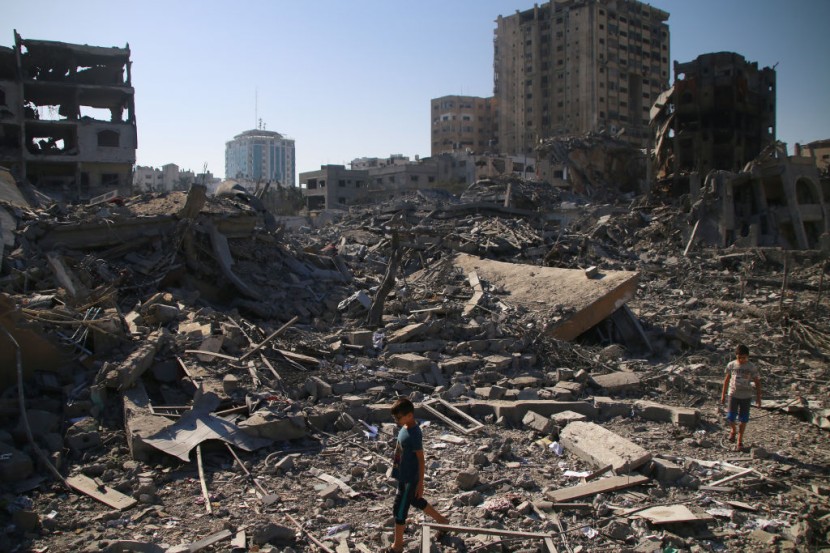Israeli Prime Minister Benjamin Netanyahu stated on Sunday that the military offensive of Rafah in southern Gaza was going to happen once Israel concluded its strategy to allow the over one million people taking refuge there to evacuate.
During an appearance on 'This Week With George Stephanopoulos,' Netanyahu offered the following statement: "Those who say that under no circumstances should we enter Rafah are basically saying: 'Lose the war' as per New York Times.
Biden Urges Humanitarian Action Amid Israeli

Israeli strikes targeted the vicinity of Kuwait Hospital in Rafah, as reported by an Associated Press journalist on the ground. The Israeli military, in a statement, mentioned hitting "terror targets in the area of Shaboura," a district within Rafah. The series of strikes concluded without detailing specific targets or assessing potential damage and casualties.
As a result of the strikes, some wounded individuals were brought to Kuwait Hospital, although Palestinian health officials did not immediately provide casualty information.
US President Joe Biden expressed his concerns in what was described as his most forceful language yet on a potential military operation. In a 45-minute conversation with Israeli Prime Minister Benjamin Netanyahu, Biden emphasized the need for "urgent and specific" measures to strengthen humanitarian aid.
The discussion largely focused on the potential for a cease-fire agreement, with a "framework" now in place, indicating progress in negotiations that could lead to the release of remaining hostages held by Hamas.
Despite acknowledging that "gaps remain," a senior US administration official, speaking on condition of anonymity, highlighted the impact of military pressure on Hamas in the southern city of Khan Younis, bringing the group closer to accepting a deal.
Amidst diplomatic efforts, concerns surfaced over a potential Israeli ground invasion of Rafah. Egypt reportedly threatened to suspend its peace treaty with Israel if troops entered Rafah, citing fears of the conflict pushing Palestinians into the Sinai Peninsula and disrupting Gaza's main aid supply route.
The threat to suspend the Camp David Accords, a longstanding regional stability cornerstone, came after Netanyahu insisted on the necessity of sending troops into Rafah to secure victory in the four-month war against Hamas. Netanyahu asserted that Hamas had four battalions in Rafah, according to Missoulian.
Read Also: Netherlands: Ex-Dutch PM Dries van Agt, Wife Die 'Hand in Hand' by Euthanasia
Netanyahu Silent on Biden Call as Tensions Rise
While Netanyahu's office declined to comment on the call with Biden, Hamas warned that any invasion of Rafah would jeopardize ongoing talks mediated by the United States, Egypt, and Qatar.
There has been a recent incident involving an Israeli drone that targeted a vehicle near Lebanon's southern port city of Sidon. As a result, there have been reports of two casualties and two injuries. An airstrike, located about 37 miles from the Israeli border, was one of the most significant attacks into Lebanon since the recent increase in violence along the Lebanon-Israel border on Oct. 8.
The situation continues to unfold as aid groups express concerns that an offensive in Rafah would exacerbate the already dire humanitarian crisis in Gaza, where around 80% of residents have fled their homes.
President Biden emphasized the need to build on negotiation progress for the release of hostages while facing growing pressure to adjust his stance on the conflict, particularly from younger voters. Friction points between the US and Israel include efforts to create a buffer zone within Gaza, postwar security control, and the rate of Palestinian civilians' return to north Gaza.
Netanyahu affirmed that security control would remain with Israel, even if a presence inside Gaza was required. Israel's plan to push into Rafah further complicates relations with Egypt, which has reinforced its border defenses and warned of potential suspension of the peace treaty.
As the diplomatic landscape shifts, concerns persist over the potential impact of military actions on both the humanitarian situation in Gaza and the stability of the region, The Wall Street Journal reported.
Related Article: Kim Jong Un Threatens To Occupy South Korea Territory, Destroy Seoul, Other Enemies as It's Pyongyang's 'Legal Right'
© 2026 HNGN, All rights reserved. Do not reproduce without permission.








